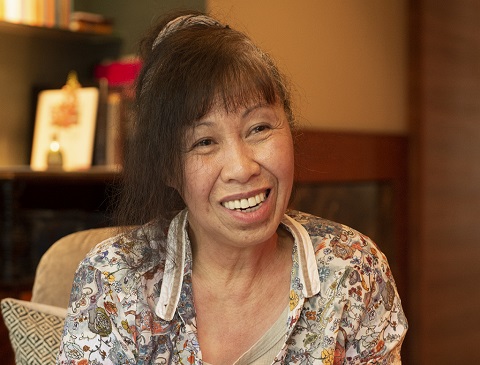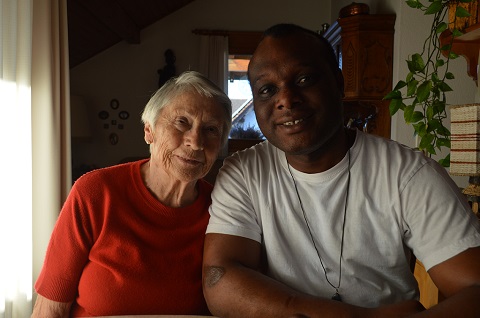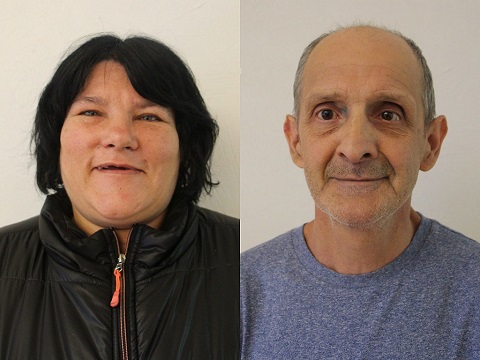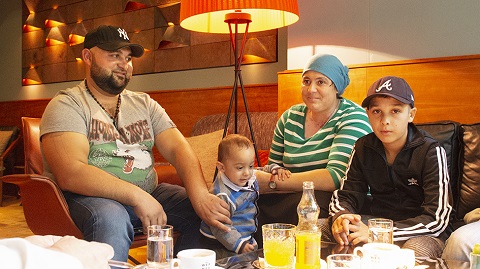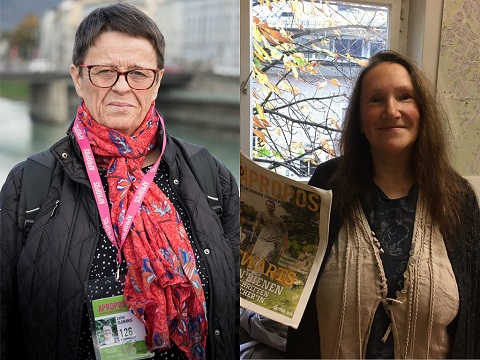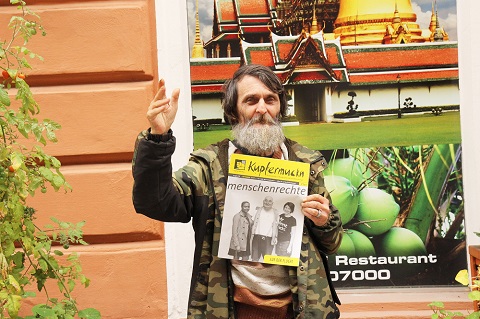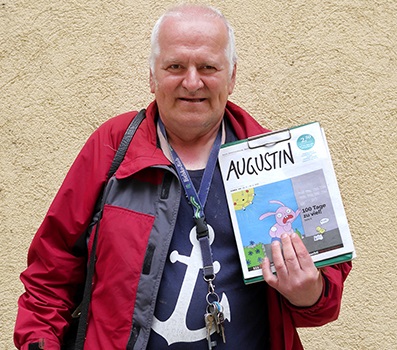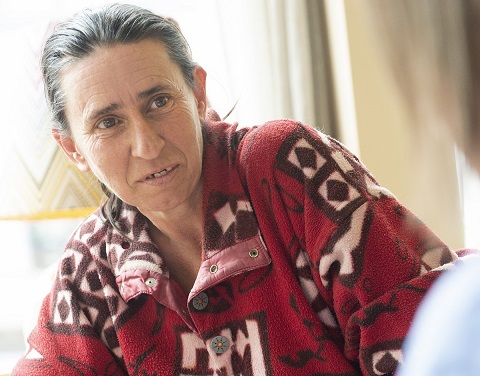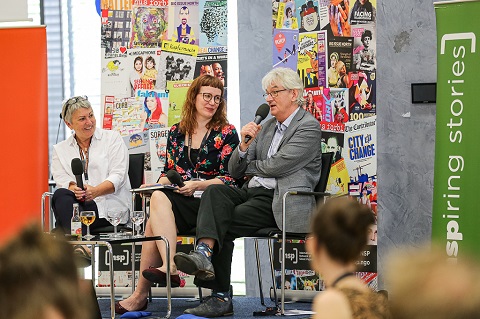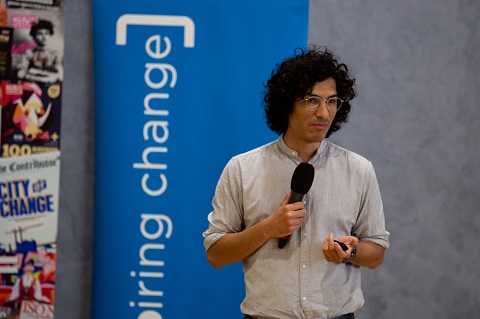Interview by Christina Repolust, Apropos
Michaela Gründler, the editor-in-chief of Apropos, started working at the street paper on 1 February 1999. In this interview, she looks back on the last 20 years and talks about how the image of Apropos has changed, the work that she and her team do behind the scenes and why she loves fairy tales so much.
Apropos: You’ve confronted the reality of homelessness, precarious living situations and the everyday worries of an Apropos seller for the last twenty years. In private, you read myths and fairy tales for fun. The heroes of these fairy tales don’t have it easy: they must get through difficulties and they can experience transformations. Is this the reason that you’re interested in fairy tales?
Michaela Gründler: That’s an interesting connection. I really like fairy tales; my relationship with this literary genre comes from a common theme in my life. Fairy tales played a big role during my childhood and, the older I became, the stronger my interest in what was hidden in the stories became. Fairy tales and myths help you to grow up: they bring the archetypal parts of our human souls to the surface. For me, they are a sort of advisor to the soul: they impart wisdom in a comfortable, non-educational way.
Which fairy tales did you grow up with specifically?
First, it was Grimm’s fairy tales. I still read fairy tales from all over the world. I especially love the ones with a strong archetypal element. I have handed down my enthusiasm for fairy tales to my nieces and nephews. When they were younger, I enthusiastically told them made up fairy tales. Michael Ende’s ‘Das Traumfresserchen’ (‘The Dream Eater’) was an important companion for me: it’s a story about being scared of bad dreams, the kind that don’t let you fall asleep, until the Dream Eater helps you.
You’ve been working with and for people who live their lives day by day in harsh conditions – homelessness, addiction, mental illness – for twenty years. Selling Apropos gives them structure, respect and brings them happiness. How has the small miracle that is Aporopos succeeded month after month for two decades?
The Dream Eater in the story by Michael Ende calms the upset and the desperate. I do the same with my team. In contrast to other street papers in Austria, where the editorial staff and sellers are mostly physically separate, our editors and newspaper editors are next door. It’s challenging, especially if we’re in the process of doing the final edit. But I wouldn’t want to miss out on this closeness for anything in the world. I always want to know how particular individuals are doing.
![Michaela Gründler [Credit: Andreas Hauch]](https://hub.insp.ngo/wp-content/uploads/2019/05/APR_20-years-at-Apropos_1.jpg)
Is the term ‘intimacy’ too much when I refer to your relationship with the sellers?
Intimacy is a great term. We make contact through meetings, not only between the sellers and ourselves but also on the street. Our sellers build a space for themselves on the street and create relationships. The readers call the editorial staff regularly and ask where their seller is staying or whether they are well. These calls demonstrate that the sellers and customers build a relationship: they are related to each other through this, and many readers look to have a conversation with our sellers. That’s worth more than the 2.50€ that’s swapped for a copy of Apropos.
When you read the newspaper, you get the impression – as a reader – that someone is knocking on the door, coming in and telling you a story.
It makes me really happy that our work is so important. This closeness really is there from Monday to Friday. The stories come to us and either we tell them or encourage and support the sellers to tell their stories themselves. Our book projects are only possible through this closeness because the individuals can speak openly and honestly in a place where they know they are believed and understood. The Apropos books, Denk ich an Heimat (I’m thinking of home) or So viele Wege (So many paths), show the variations in our group of sellers through words and pictures.
Variation brings a lot of energy with it. Journalism thrives on living interactions, but it also needs concentration and quiet. How do you manage to differentiate between the two at Apropos?
I’ll ask you the same question. What is differentiation? I am a human who gives themself completely to one thing or the other. Sometimes more than necessary. Furthermore, I’m easily tempted to take on responsibility – not only for myself, but also for others. In this area, I have a lot to learn and I practice relinquishing responsibility daily. The sellers have their own areas of development and it’s not my job to take that from them. However, I always have to bear in mind that I feel a strong, distinct and automatic need to help.
How would you finish the sentence “I’m the Editor-in-Chief of the Apropos street paper and…”?
That’s easy. I’m the Editor-in-Chief of the Apropos street paper and it is my responsibility to ensure that everything works. I take responsibility for the team and the sellers. At the beginning of the year this responsibility sometimes led to a lot of work for me. But life sent me a signal and it led me down the right track and to my own centre. Only if I respect myself am I able respect others as well.
As a cyclist you’re very brave, which is proven by the many photos of you in all kinds of weather. You support important causes, such as immigration and homelessness. And then there’s the other side of you: you have offered yoga lessons to Apropos readers and sellers for a few years now.
I found my form of yoga, Kundalini yoga, in 2013. It was the next logical step after completing my training as a yoga teacher. I also meditate daily: it gives me a clear focus for the day and also gives me the stability that allows me to respond better to people throughout the day. I enjoy the Apropos yoga class every Wednesday, where the sellers and buyers meet on the mat. There is lots of room there for careful body awareness as well as rewarding conversations when we sit together afterwards.
In your editorials, you are open about your experiences and thoughts. The term ‘mindfulness’ comes to mind. How do you balance mindfulness and critical journalism?
When I started working at Apropos, my work was defined as being objective journalism more than it is today. It is also important for me today to have a critical view of the world. But, in the meantime, as well as meeting the objective criteria of journalism, I am even more concerned with things at the level of relationships. What is objectivity and what is humanity? I think both can be combined. I want people to experience life behind the scenes and not just to see the pure, objective facts. That has also changed in the world of the media. The personality and personal aspect of journalism is no longer frowned upon, per se. In recent years, we have moved towards telling more and more stories, not only about others but also about ourselves as well. We are determined to give our readers a real taste of what goes on behind the scenes of the street paper.
When I started working at Apropos 20 years ago, a lot of journalism colleagues asked me, “How long do you want to do that for? When will you start at a proper newspaper?” Over the years, these questions have changed. Now people say: “When you’re done at Apropos, think about me; I’d like to take over.”
You provide your 10,000 readers with articles written on interesting topics, as well as a newspaper full of reports, interviews, and stories, 12 times a year. How do you manage this?
Well, our readers only read the topics that are successful. No, seriously: we deliberately keep the topics open. Then the editorial staff consider which current topics come to mind and whether we know someone who might have something to say on the issue. We go in the direction of social issues, culture and exciting interviews – if our ideas flow then we know that a topic has survived, as it were. Otherwise we change the topic or discard it, in which case you don’t read anything about it. In addition to this, I read constantly, both early morning and after work. I have also recently discovered children’s and young adult literature, and another thing I’ve found are books about psychology and spirituality. I am always trying to grow within myself because if you understand yourself better, then you can understand others better.
Both your editorial team and marketing staff have changed over time. Consistency, change and growth are closely related, aren’t they?
When I started working at Apropos 20 years ago, a lot of journalism colleagues asked me, “How long do you want to do that for? When will you start at a proper newspaper?” Over the years, these questions have changed. Now people say: “When you’re done at Apropos, think about me; I’d like to take over.” The newspaper and I have grown together, and the team has also changed; however, professionalism and a clear focus have shaped the last 20 years. Both of my editors bring diverse approaches, topics and thoughts to the table, which relives me of a lot of pressure. Apropos has always been perceived as being a professional media publication, which is demonstrated by the prizes [see info box] that we have won over the years: these were – and are – a recognition of all of our work, including the work of the editorial staff, the marketing team and the sellers.
The texts produced in the writing workshops run by Apropos are a significant part of your work and these workshops allow the vendors to articulate themselves in whatever way they wish. In the vendor articles, a particular Apropos seller is put in the spotlight each month. How time intensive is this process?
It’s very time intensive and I have to tell you that every minute is well invested. We want our sellers to achieve their true potential. In addition to telling us their stories on the street, vendors can also put their stories down on paper in a safe environment with the help of our editors during the workshops. Those who take part in the writing workshops feel an increase in their sense of self-worth, they receive feedback on their writing and we interact with them on the basis that they can and want to talk about themselves. We don’t talk about them, but with them. They write what moves them.
You go to football and ice hockey games, the Salzburg festival, exhibitions and concerts with your sellers. In each case, you are gifted the tickets. However, that fact isn’t well known, wouldn’t you say?
Well, today it is. For many years, I was, as people put it, part of every ‘dog-fight’: I did a lot of networking and I’m still doing it today. I was a voluntary member on numerous executive boards, such as Salzburg Media Women, on Salzburg’s community radio, Radiofabrik and on the city’s cultural advisory committees, as well as working for the International Network of Street Papers (INSP). Currently, I am a member of the Media Commission of the Archdiocese. For many years, the organisers have come to us by themselves. Meanwhile, there is also a call for sponsorship, which is difficult to establish but is also a way of receiving recognition for all of our work.
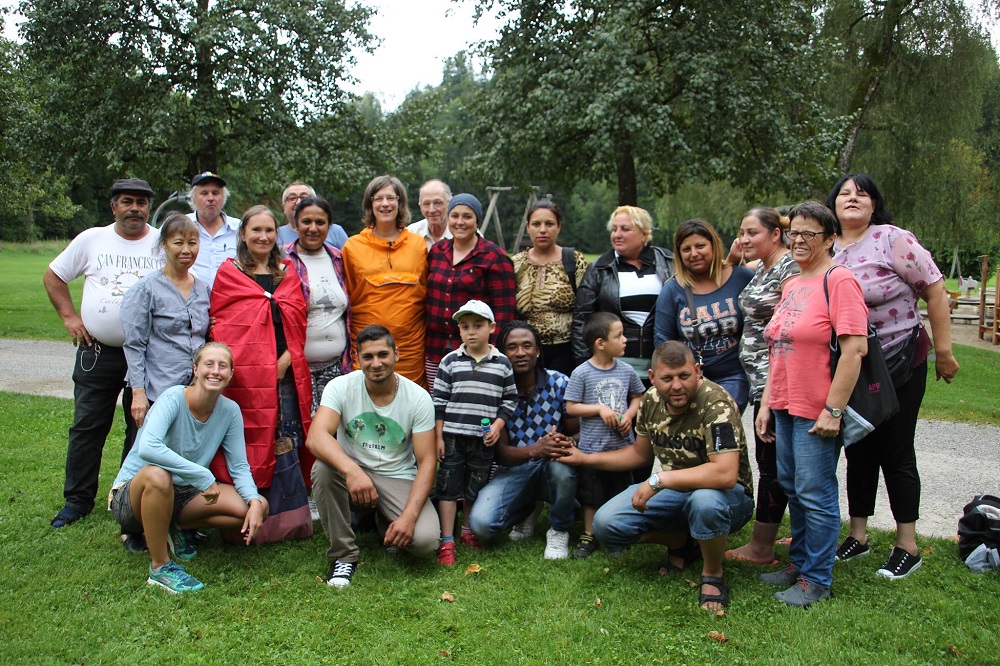
In addition to exploring social issues, there is also space for explorations of culture in each edition of Apropos. Why is this?
I come from a cultural journalism background: I studied German philology and journalism and I worked as a cultural journalist at the Salzburg Volkzeitung when I began my career. That shaped me. Apropos can explore both social and cultural issues – and that’s what I’m proud of. I fully understand culture. It’s only when life’s necessities – somewhere to live, food and health – are sufficiently covered, that a free space for culture is created. If we go to museums with our Austrian, Romanian and African sellers, we open up these free spaces for them. Museum visits turn them into participants in culture and that also changes their outlook.
Growth sometimes sounds so simple – and many have the idea that you can grow personally without experiencing crises. But the reality is that hardship can be instructive. Which event has recently helped you to grow?
Before Christmas in 2018 I was thrown off my bike badly. Despite all of the pain, I made it into a wonderful experience. I learned that I should – and can – ask for help. That was hard for me because I find it difficult to ask for help. Before, I simply went through live so that I could help others. This role reversal was a wonderful experience: I was not in danger and nor was I alone. We can all count on the help of others and, in the end, and we will all grow as a result.
***
My 20 years with Apropos and…
… Amazement: When I began at the Salzburg street newspaper on 1st February 1999, it had already been going for over a year. At the time, there were so many uncertainties that in the first year I kept asking myself, “I’m curious how long this paper will last?” And, behold, I’m now celebrating 20 years of being at the street paper!
… Vendors: In the last two decades our sellers have diversified. My marketing colleague, Hans Steiniger, expresses it so well: “The EU with Africa – that’s how colourful the Salzburg street paper is”. What remains the same is the fact that the destinies of our men and women continue to affect me. And I admire their strength to make the best out of the few things that they often have in life.
… Teamwork: In the past few years, I have split both the editorial and the marketing team’s hours. Now, five – instead of three – of us share roles that are equivalent to 2.5 full-time positions. It’s so much fun, working with different generations – our youngest employee is 23 and the oldest is 66.
… Pleasure: As I have always done, I find it a gift to be able to create an independent newspaper that helps others to help themselves. This combination of shared creativity, humanity and sensibility makes the work so enriching.
… Grief: Some of our sellers and writing workshop authors have died, especially in the past decade. It has always affected me how few people were at some funerals and I felt feelings of loneliness strongly at the graveside.
…Challenges: Naturally, there are always challenges and sometimes they have also pushed me to my limits. What I admire so much about our sellers is their ability to get up again and again and to turn a crisis into something that has, ultimately, allowed them to grow. That was something I myself have experienced time and again over the last 20 years.
… Prizes: We have received numerous prizes during the last ten years. In March 2009, Apropos received the René-Marcic-Prize for excellent journalistic efforts; in 2011, it won the Salzburg People’s Culture Prize (Salzburger Volkskulturepreis); in 2010, it won the Sozialmarie Award for the book Denk ich an Heimat (I’m thinking of home); and, in 2013, it won the International street newspaper award in the category “World’s Best Seller Post” for the book So viele Wege (So many paths). In 2014, Apropos won the Salzburg City Radio Prize and the Rose für Menschenrechte (“The Rose for Human Rights”). In 2015, the Apropos Kundalini Yoga reached the final of the International Street Newspaper awards, in the category “Best Street Paper Project”. In 2016, the special edition magazine Literature & Ich (Literature and Me) came in the top 5 of the INSP Awards in the category “Best Breakthrough”.
Translated from German by Catherine Castling







